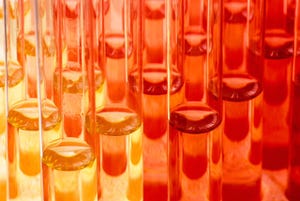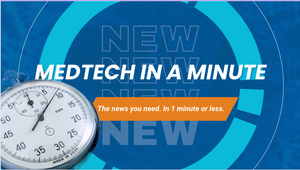Medtech Developers Share How Their Products Were Used on Family
Most of our medtech design and engineering readers at Qmed/MPMN say they they would be comfortable implanting their medical devices in themselves and their relatives.
In hindsight, the results of the recent informal survey, in which about 95% were either comfortable or somewhat comfortable, are pretty expected. But some of the anonymous comments are pretty interesting, if not downright inspiring.
There are medtech designers telling stories of relatives actually using devices. Some discuss their attention to detail and quest for perfectionism, while others fret about the other profession in the mix, the actual surgeons and doctors.
Here are 20 quotes that caught our eye:
"Recently my wife fainted in the bathroom in the middle of the night and I had to use our prototype patient monitor to measure her vitals and this saved us some valuable time and expenses as it turned out to be a case of hypoglycemia and nothing more serious so we didn't have to rush her to the ER and waste all the money."
"[Our medical device] has been used on a loved one during her last days. We were very reassured by this."
"I've always designed devices as if my Mother was going to use it; at the same time I'd be more uncomfortable if my Mother or other close relative was using/receiving my device. I think that's only natural."
"Being a perfectionist is a requirement for a excellent medical device engineer. Being so you are always thinking of things that can go wrong--most out of your control. I was never able to watch the device being used even though it saved many lives, for fear that something would go wrong."
"I would specifically request my device or try to find a facility that was already a customer."
"The few times I've found out anything but our products are being used [in people I know], I urge them strongly to talk to their doctor and get [the products] switched because I know very well how poorly all the competition makes their devices and have faith in ours."
"The thing is that my device is neither life supporting nor critical, so even a complete device failure would simply result in a minor and very limited waste of time for the surgeon."
"The surgery complication rate for the current surgery is 23.1%, with our product the complication rate is less than 0.1%."
"The surgeon using the device is my concern!!!"
"My sister was treated on one of our machines"
"I trust in our device; we have 30 years of data that shows its benefit. However, in working so closely with it, I know about all of the potential complications and risks. So I'd feel comfortable using it, but still somewhat concerned about the outcome."
"Absolutely. I have worked with many surgeons and inventors over the years and we have always taken the care and attention to detail when building our products. I presently have one of our medical devices in me and it has functioned well for years. I also have a competitor's product in me that has done well for years. It is obvious when poor products are available like metal on metal hips. I have no idea how the engineers sold that to the manufacturers or the public."
"100% confident. There is always some risk in any procedure and the human element is always present. The devices we have developed are as safe as possible given the state of current technology."
"I am on the programming team for a infusion pump. I have had it used on myself during a surgery, for anesthesia. My coworker had it used on her slightly premature baby, and I don't think she was worried either. Our product has a good quality track record, and quality is important to our organization."
"I have been in orthopedics since 1983. All the companies in Warsaw, IN use this statement as the final test before a product is launched."
"Please note that FDA has in the past and still does approve mediocre devices and stops better performing ones, because one company might have better regulatory personnel or lawyers that know how to approach the FDA. Therefore punishing the good guys and rewarding the bad ones happens all the time."
"I've worked on many medical devices -- surgical, diagnostic, and drug delivery. Given a medical need, I would be entirely comfortable if any were used on me or a family member. (In fact, a vena cava filter device on which I was a development team member was implanted in my father.) I can't imagine working on a device about which I felt otherwise."
"One night I had extreme abdominal pain that required a trip to the emergency room at 4am. The initial triage did not point to any specific cause so a CT scan was ordered. As I was wheeled into the scan room slightly sedated, I realized that they were about to use a medical device on me that I had been on the development team for. Additionally, my husband, who was in the waiting room, had been on the software team for the device. I told the CT Tech that I helped design and develop the device, but I don't think she believed me through my slight haze of the sedative. I was confident in the use of the device and had no qualms with it being use do me. I know that that device has also been used on other family members and I'm confident and proud to know that it's helping save lives. My CT scan showed that there were no major concerns for my abdominal pain and I was sent home to recover."
"My Mother, Brother and Sister-In-Law all received a STJ Pacemaker and for my Mother it saved her life. The Cardiologist told me that if not for the Pacemaker the medicine they gave her would have ended her life. What a warm fuzzy feeling that was."
"The device that I work on was used on my wife. We had different options available and I insisted that the device on which I worked be used because I know it to be safe and highly effective."
Related article:
95% of MedTech Developers Confident in Their Devices
Chris Newmarker is senior editor of MPMN and Qmed. Follow him on Twitter at @newmarker. Brian Buntz is the editor-in-chief of MPMN and Qmed. Follow him on Twitter at @brian_buntz.
About the Author(s)
You May Also Like


